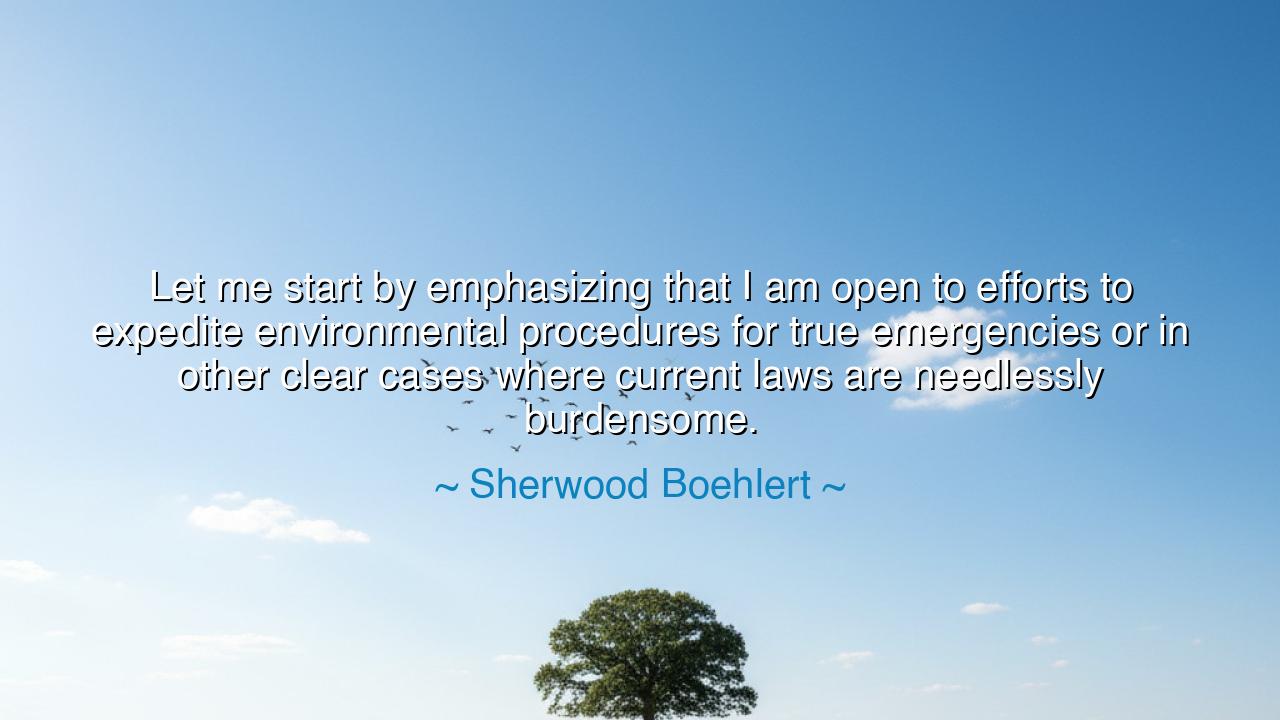
Let me start by emphasizing that I am open to efforts to expedite
Let me start by emphasizing that I am open to efforts to expedite environmental procedures for true emergencies or in other clear cases where current laws are needlessly burdensome.






The words of Sherwood Boehlert, “Let me start by emphasizing that I am open to efforts to expedite environmental procedures for true emergencies or in other clear cases where current laws are needlessly burdensome,” resound with the balance of wisdom and restraint. They reveal the heart of a leader who understood that law must never become a rigid idol, nor should it become so inflexible that it hinders the protection of the people. Boehlert, long known as a defender of science and the environment, speaks here not as one who would discard safeguards, but as one who recognizes that in moments of true peril, speed and decisiveness may save both lives and the earth.
The origin of this declaration lies in the debates of environmental governance in the United States during Boehlert’s time in Congress. For decades, environmental laws were written to slow destruction, to compel industries and governments to tread carefully upon the earth. Yet critics argued that in some cases, these same laws became obstacles, even in urgent situations where swift action was needed—for example, repairing broken infrastructure after a natural disaster or responding to sudden industrial accidents. Boehlert, cautious but pragmatic, acknowledged this tension. His words are not a surrender to deregulation, but a careful opening: that procedures should be expedited only in “true emergencies” or when the law itself creates burdens without purpose.
History gives us a vivid example in the disaster of the Exxon Valdez oil spill in 1989. When crude oil poured into Alaska’s Prince William Sound, the devastation to wildlife and communities was immense. Quick action was needed—containment, cleanup, protection of shorelines. Yet legal disputes, bureaucratic procedures, and conflicting authorities slowed the response. The lesson was clear: while laws are meant to safeguard, they must never stand in the way of urgent action to prevent greater harm. Boehlert’s wisdom reflects this: that emergencies demand speed, not endless entanglement.
The deeper meaning of his words is the call for balance. Too little regulation, and the earth suffers at the hands of greed and haste. Too much rigidity, and even noble laws may strangle the very efforts they were meant to enable. Boehlert, as a steward of environmental progress, sought the narrow path: a system strong enough to defend against abuse, yet flexible enough to move quickly when the world trembles with crisis. His message is both practical and moral: laws exist to serve life, not the other way around.
Yet his caution is also evident. He warns that exceptions must be rare, for the temptation of power is to declare every inconvenience an “emergency.” If expedience becomes the norm, then protections will crumble, and the door will be opened to exploitation. The safeguard lies in his words “true emergencies” and “clear cases”—a reminder that exceptions must be defined with clarity, lest they become excuses for greed. Here lies the deeper wisdom: that even flexibility must be bound by conscience.
The lesson for us today is profound. In our communities, in our governments, and in our own lives, we must be willing to discern when rules should hold firm and when they should bend for the sake of higher purposes. Whether it is an environmental crisis, a humanitarian disaster, or a family emergency, let us remember that principles guide us, but compassion and urgency may at times demand swifter action. To cling to rules blindly is folly; to discard them recklessly is ruin. The wise heart knows when to hold and when to release.
Therefore, let us act as stewards who honor both law and life. Support laws that protect the earth and its people, but do not let bureaucracy become an obstacle to mercy or protection. Demand leaders who can tell the difference between convenience and crisis, and who will act swiftly only when truly necessary. And in our own affairs, let us not become slaves to routine when a friend or neighbor stands in sudden need—let us act first to preserve, and refine the rules later.
So let Boehlert’s words be remembered: “Open to efforts to expedite… for true emergencies.” They are a beacon of balance, a lesson in discernment, a call to be both firm and flexible. Let future generations learn from them, and let us strive always to honor the spirit of the law: to safeguard life, protect the earth, and act with wisdom when the storms of crisis break upon us.






AAdministratorAdministrator
Welcome, honored guests. Please leave a comment, we will respond soon